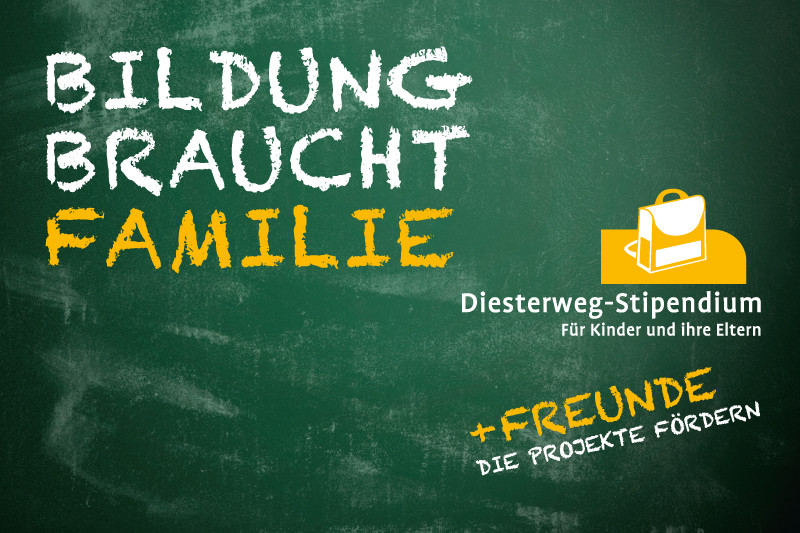Diesterweg Scholarship is a Model of Successful Cooperation

“Education needs family” is the title on a recent advertisement from the Software AG Foundation and other foundations that are carrying out a scholarship program called the Diesterweg Stipendium (DWS). In this interview, Walter Hiller, Director of Communications at the Software AG Foundation, discusses what makes this scholarship program so special and why effective cooperation is the secret to this and other successful projects.
Mr. Hiller, what does this slogan mean, and what is so special about this scholarship?
The importance of the family environment for children's success in school is well known - but to this day it remains difficult, in special situations, for institutions to have a positive impact on this factor. Foundations and non-governmental initiatives are able to support children in the crucial transition phase to secondary school, together with their parents and siblings, while still respecting the existing institutional boundaries. The scholarship program coaches fourth-grade students on many levels; but beyond that, the whole family becomes familiar with the German school system and with the extracurricular learning opportunities in their community. In this way we increase the chances of success not only of the scholarship recipients, but also of younger siblings, because education becomes a “family issue”.
What has your experience been like so far in Darmstadt, and what has the national feedback been?
In Frankfurt am Main, where the Polytechnische Gesellschaft first developed the Diesterweg Scholarship carried it out several times, there is clear evidence that it has a long-term positive impact on the participating children and their families. After more than a year of cooperation with Darmstadt families, one can see that the fourth graders are enjoying a successful transition to secondary school, and there is more confidence in interactions with one another. Of course, alone this aspect of appreciation encourages people to approach what was perhaps previously unknown.
So education is only successful when it is a community effort - this is what the model of the DWS makes clear. To what extent is the ideal of communication reflected in the scholarship organisation itself?
As already mentioned, it's a matter of overcoming the prevailing institutional boundaries. The project is only possible because elementary school teachers nominate children for the scholarship, an another organisation - in Darmstadt, the Diakonische Werk of the Lutheran church - carries out the “processing”, and an organisation called Sprachpuzzle, who are very competent in work with migrants, carried out the concrete work together with pedagogy students and volunteers. In addition we experienced positive cooperation with local authorities, libraries, museums, transportation, the media, and more - all of whom were happy to get involved with this project. This side effect is so contagious that the Diesterweg Scholarship is being introduced in multiple other German communities.
Could one say that through cooperation, foundations could take a more active and formative role in civil society, as is for example also strongly recommended in the Robert Bosch Foundation's report on the future of foundations?
As important as financial support can be, the cooperation between different organisations also proved crucial for the quality of the project in Darmstadt. The network and bonds that developed in the Diesterweg Scholarship will be different in every location - despite a common basic intention. The annual exchange of ideas and experiences, also thanks to the Polytechnische Gesellschaft Foundation, is very valuable and makes clear that every location has unique forms of engagement. Other cities are already chomping at the bit to participate - proof of the project's positive resonance.
What are your hopes for the future? How would you like to see the DWS further develop in Darmstadt, to what extent do you see further potential for adopting the format in other cities and regions?
The execution and success of the scholarship made clear what cooperation can achieve. It is desirable for these kinds of models to inspire more cooperation from authorities in the direction of the much-promised "culture of responsibly." What is possible today only through the activities of foundations may need to be modified, but in general, we must do a better job of ensuring that no child is left behind.
The Diesterweg Scholarship
The Diesterweg Scholarship, named after the well-known German educator Adolph Diesterweg, is a family scholarship developed by the Stiftung Polytechnische Gesellschaft, a Frankfurt foundation. Its goal is to jointly support children, siblings and parents in the fourth and fifth grades. The program offers workshops and excursions that increase the children's and families' familiarity with the German school system, with learning techniques and with informal learning opportunities where they live. The program offers workshops and excursions that increase the children's and families' familiarity with the German school system, with learning techniques and with informal learning opportunities where they live. In addition to individual counselling, the families get to know the local library, go to the theatre and to museums, and enjoy the attention and appreciation of the scholarship team and the project partners. The students are also supported throughout their first year in secondary school to ensure a solid basis for continued success.
Experiences with the Diesterweg Scholarship in Frankfurt, Hamburg and Hannover haven demonstrated that - beyond the academic success of the fourth- and fifth-graders - the joy of success has been contagious and empowering for many others both directly and indirectly involved.
The aims of the Diesterweg Scholarship are:
- to support children with high performance potential in receiving an academic education that corresponds to their abilities;
- to ensure that children with a non-German background successfully navigate the transition from primary school to secondary school and can be successful there;
- to increase parents' ability to supervise their children's education and to act as educational advisors;
- to bring together people from very different cultural backgrounds and life situations; and
- to bring into contact people from different city neighbourhoods.
